G1 exam study guide - Study guides, Class notes & Summaries
Looking for the best study guides, study notes and summaries about G1 exam study guide? On this page you'll find 80 study documents about G1 exam study guide.
Page 4 out of 80 results
Sort by
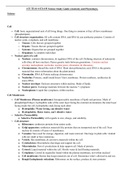
-
ati teas 6 exam science study guide anatomy and physiology
- Exam (elaborations) • 18 pages • 2023
-
Available in package deal
-
- $20.49
- + learn more
ATI TEAS 6 EXAM S cience Study Guide (Anatomy and Physiology). Science Cell Cell: basic organizational unit of all living things. One thing in common is they all have membranes (phospholipids). Cell structure organization: All cells contain DNA, and RNA & can synthesize proteins. Consists of nucleic acids, cytoplasm, and cell membrane. o Tissues: Cells that are grouped together o Organs: Tissues that are grouped together o Systems: Organs that are grouped together o Organism: A...

-
ATI TEAS 6 EXAM STUDY GUIDE
- Exam (elaborations) • 29 pages • 2023
-
- $14.29
- + learn more
September 9 -13 2020 ATI TEAS 6 EXAM STUDY GUIDE Science Cell Cell: basic organizational unit of all living things. One thing in common is they all have membranes (phospholipids). Cell structure organization: All cells contain DNA, and RNA & can synthesize proteins. Consists of nucleic acids, cytoplasm, and cell membrane. o Tissues: Cells that are grouped together o Organs: Tissues that are grouped together o Systems: Organs that are grouped together o Organism: A complete individu...
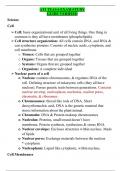
-
ATI TEAS 6 EXAM STUDY GUIDE VERIFIED
- Exam (elaborations) • 30 pages • 2024
-
- $13.99
- + learn more
ATI TEAS 6 EXAM STUDY GUIDE VERIFIED Science Cell Cell: basic organizational unit of all living things. One thing in common is they all have membranes (phospholipids). Cell structure organization: All cells contain DNA, and RNA & can synthesize proteins. Consists of nucleic acids, cytoplasm, and cell membrane. oTissues: Cells that are grouped together oOrgans: Tissues that are grouped together oSystems: Organs that are grouped together oOrganism: A complete individual Nuclear parts of a...
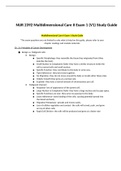
-
NUR 2392 Multidimensional Care II Exam 1 (V1) Study Guide
- Exam (elaborations) • 31 pages • 2022
-
- $13.99
- + learn more
NUR 2392 Multidimensional Care II Exam 1 (V1) Study Guide Multidimensional Care II Exam 1 Study Guide *The exam questions are not limited to only what is listed on this guide, please refer to your chapter readings and module materials Ch. 21: Principles of Cancer Development ● Benign vs. Malignant cells ○ Benign: ■ Specific Morphology- they resemble the tissue they originated from (they look like the host). ■ Small Nuclear to Cytoplasmic Ratio- they have a similar structure in...
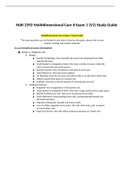
-
NUR 2392 Multidimensional Care II Exam 1 (V1) Study Guide
- Exam (elaborations) • 31 pages • 2022
-
- $13.99
- + learn more
NUR 2392 Multidimensional Care II Exam 1 (V1) Study Guide Multidimensional Care II Exam 1 Study Guide *The exam questions are not limited to only what is listed on this guide, please refer to your chapter readings and module materials Ch. 21: Principles of Cancer Development ● Benign vs. Malignant cells ○ Benign: ■ Specific Morphology- they resemble the tissue they originated from (they look like the host). ■ Small Nuclear to Cytoplasmic Ratio- they have a similar structure in...
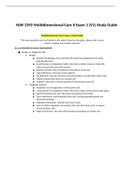
-
NUR 2392 Multidimensional Care II Exam 1 (V1) Study Guide
- Exam (elaborations) • 31 pages • 2022
-
- $13.99
- + learn more
NUR 2392 Multidimensional Care II Exam 1 (V1) Study Guide Multidimensional Care II Exam 1 Study Guide *The exam questions are not limited to only what is listed on this guide, please refer to your chapter readings and module materials Ch. 21: Principles of Cancer Development ● Benign vs. Malignant cells ○ Benign: ■ Specific Morphology- they resemble the tissue they originated from (they look like the host). ■ Small Nuclear to Cytoplasmic Ratio- they have a similar structure in...
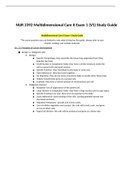
-
NUR 2392 Multidimensional Care II Exam 1 (V1) Study Guide
- Exam (elaborations) • 31 pages • 2022
-
- $13.99
- + learn more
NUR 2392 Multidimensional Care II Exam 1 (V1) Study Guide Multidimensional Care II Exam 1 Study Guide *The exam questions are not limited to only what is listed on this guide, please refer to your chapter readings and module materials Ch. 21: Principles of Cancer Development ● Benign vs. Malignant cells ○ Benign: ■ Specific Morphology- they resemble the tissue they originated from (they look like the host). ■ Small Nuclear to Cytoplasmic Ratio- they have a similar structure in...

-
ATI TEAS 6 EXAM STUDY GUIDE 2023-2024
- Exam (elaborations) • 43 pages • 2023
-
- $10.49
- + learn more
ATI TEAS 6 EXAM STUDY GUIDE Science Cell Cell: basic organizational unit of all living things. One thing in common is they all have membranes (phospholipids). Cell structure organization: All cells contain DNA, and RNA & can synthesize proteins. Consists of nucleic acids, cytoplasm, and cell membrane. o Tissues: Cells that are grouped together o Organs: Tissues that are grouped together o Systems: Organs that are grouped together o Organism: A complete individual Nuclear parts of a ce...
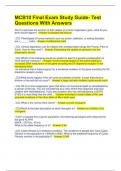
-
MCB10 FinalMCB10 Final Exam Study Guide- Test Questions With Answers Exam Study Guide- Test Questions With Answers
- Exam (elaborations) • 11 pages • 2024
-
- $12.99
- + learn more
MCB10 Final Exam Study Guide- Test Questions With Answers CQ-If a cell loses the function of both alleles of a tumor suppressor gene, what do you think would happen? - Answer-increased cell division /.CQ- Phenotypes of human behavior such as autism, addiction, or eating disorders are..(______ traits) - Answer-multifactorial traits /.CQ- Clinical depression can be treated with antidepressant drugs like Prozac, Paxil or Zoloft. How do they work? - Answer-Decreasing the uptake of serotoni...

-
ATI TEAS 6 SCIENCE EXAM STUDY GUIDE A+ RATED
- Other • 28 pages • 2023
-
- $13.99
- + learn more
ATI TEAS 6 SCIENCE EXAM STUDY GUIDE A+ RATED ATI TEAS 6 SCIENCE EXAM STUDY GUIDE A+ RATED Science Cell Cell: basic organizational unit of all living things. One thing in common is they all have membranes (phospholipids). Cell structure organization: All cells contain DNA, and RNA & can synthesize proteins. Consists of nucleic acids, cytoplasm, and cell membrane. o Tissues: Cells that are grouped together o Organs: Tissues that are grouped together o Systems: Organs that...

How did he do that? By selling his study resources on Stuvia. Try it yourself! Discover all about earning on Stuvia


